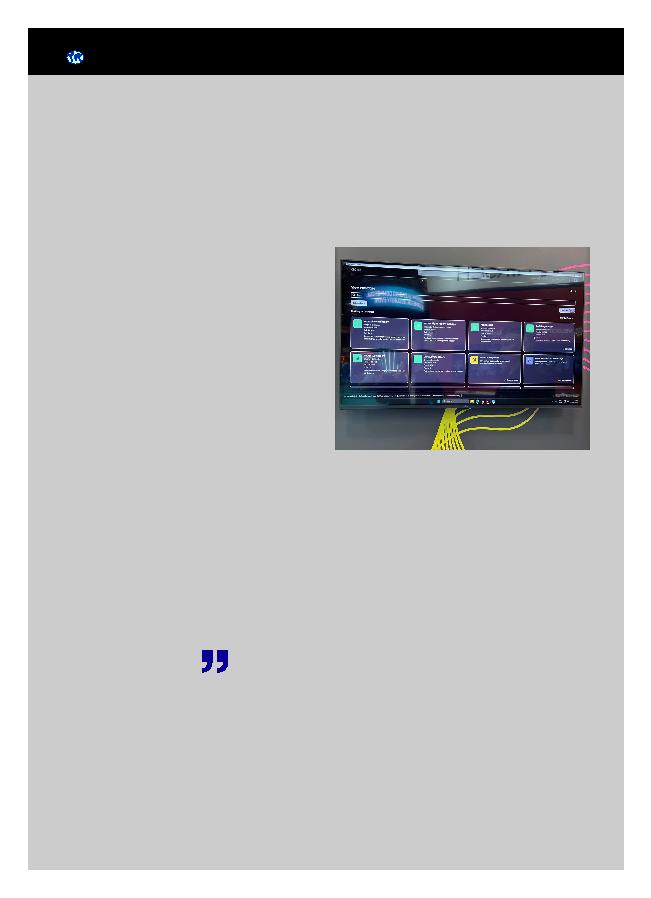
2 0 · d e t e k t o r i n t e r n a t i o n a l
Special Feature: Access Control
In January 2025, Acre Security acquired Reks.Ai
a company that have developed a large language
model designed specifically for access control.
"AI can, for example, analyse workflows and act
as a kind of watchdog within the system, respond-
ing to abnormal behaviour," explains Daniel Pers-
son, Business Development Director EMEA/
APACat Acre Security.
How AI can transform Access Control Systems
Persson compares Reks to Chat-
GPT, as both are large language
models, but Reks has been
trained specifically for access con-
trol applications. The company's
founders now work within Acre
Security.
"AI isn't yet widely used in ac-
cess control," he says, "but we're
now implementing it into our
Acre Access Control platform.
The aim is to simplify processes
so users can receive both report-
based and real-time insights into
system activity such as identify-
ing irregular behaviour."
Debut in Las Vegas
Acre Security's first AI demon-
strations in public took place at
the major security trade show
ISC West in Las Vegas in April in
2024, followed by a showcase at
The Security Event in Birming-
ham, UK. In both cases, it was
a success. The interest in AI and
its usefulness in access control
systems is evident.
Enhanced usablity
Today's access control systems
can already issue alerts for suspi-
cious behaviour for example,
when an authorised user opens a
door at an unusual time.
"But currently, this has to be
configured for each individual
door," Persson explains. "With
AI, you can imagine a system
that continuously analyses event
logs, learns what's normal, and
automatically raises alerts when
something unusual occurs."
He believes AI will make ac-
cess control systems both simpler
and more intuitive. A typical
example is in reception, when a
visitor arrives and needs tempo-
rary access.
"Currently, the receptionist
has to check the calendar, decide
when the person should have ac-
cess, and determine which doors
to open a multi-step process.
Access control systems are rarely
user-friendly, often designed by
engineers for engineers," Persson
says.
With AI, such tasks could
become effortless.
"For instance, if you tell the AI
that a visitor should have access
to the lobby and conference
room for the next two days, it
can instantly generate the re-
quired script and implement it in
real time no technical training
required."
Faster, smarter reporting
One of AI's strongest advantages
in access control is its ability
to quickly generate customised
reports.
"You might ask the AI to
show who has accessed certain
buildings during a given period
or, conversely, identify users who
haven't accessed specific areas for
months, indicating their creden-
tials might need to be revoked,"
Persson explains.
"This can all be done in sec-
onds. You could, for example, ask
for a list of everyone over 35 who
entered a specific door within
the last 52 weeks and the AI
will instantly provide it in your
preferred report format."
AI as a Security Consultant
Persson also envisions AI acting
as a virtual security consultant
analysing the entire access control
infrastructure and suggesting
improvements.
"You could ask the AI to review
how the system is structured
compared to how it's actually
being used, and then recommend
enhancements," he says. "It might
identify that too many employ-
ees have access to unnecessary
areas, or that a high number of
temporary visitors and contractors
are entering the site. Based on this,
it could suggest creating new user
groups, adjusting access levels, or
other security improvements."
He believes the potential of
large language models in access
control is still largely untapped.
"Because it's an AI, new pos-
Acre Access Control is Acre Security's latest major launch a cloud-based access control
platform offering a comprehensive suite of packaged SaaS services.
Daniel Persson, Acre Security:
You might ask the AI to show who has
accessed certain buildings during a giv-
en period or, conversely, identify users who
haven't accessed specific areas for months,
indicating their credentials might need to be
revoked."

